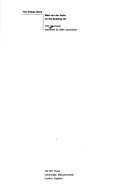Mies van der Rohe's architecture has been well documented, yet his writings that contain the key to his thought and to understanding his work have been largely unexplored. From Mies' library - including his marginal notes - and from a body of writing that is surprisingly large for the self-described "unwilling author," Fritz Neumeyer reconstructs the metaphysical and philosophical inquiry on which Mies based his modernism. An integrated view of Mies' philosophy of building, including his American career, emerges from Neumeyer's investigation. He proposes, for instance, that the Catholic church architect and writer Rudolf Schwarz, the Bauhaus thinker Siegried Ebeling, and the Catholic scholar Romano Guardini may have exerted an even greater influence on Mies than the frequently cited Plato, St. Augustine, and St. Thomas Aquinas and he points to the ways in which the thinking of other architects, such as Peter Behrens and Hendrik Petrus Berlage, affected Mies's development.
Neumeyer also asserts that while Mies fervently believed in technology, in the notion that a building's form had to emerge from the nature of its materials, this view later shifted to include personal ordering of what Mies regarded as spiritual determinants, resulting in a new unity of spirit and fact that was best exemplified in the Barcelona Pavilion. And he argues, in opposition to Bruno Zevi, that the conflict between proclassical and anticlassical concepts and ideas is always present in Mies' work, a dualism of concepts that Mies followed in all his country houses and villas of the 1920s.
- ISBN10 0262140470
- ISBN13 9780262140478
- Publish Date 1 October 1991
- Publish Status Out of Stock
- Out of Print 28 February 2001
- Publish Country US
- Publisher MIT Press Ltd
- Imprint MIT Press
- Format Hardcover
- Pages 408
- Language English
